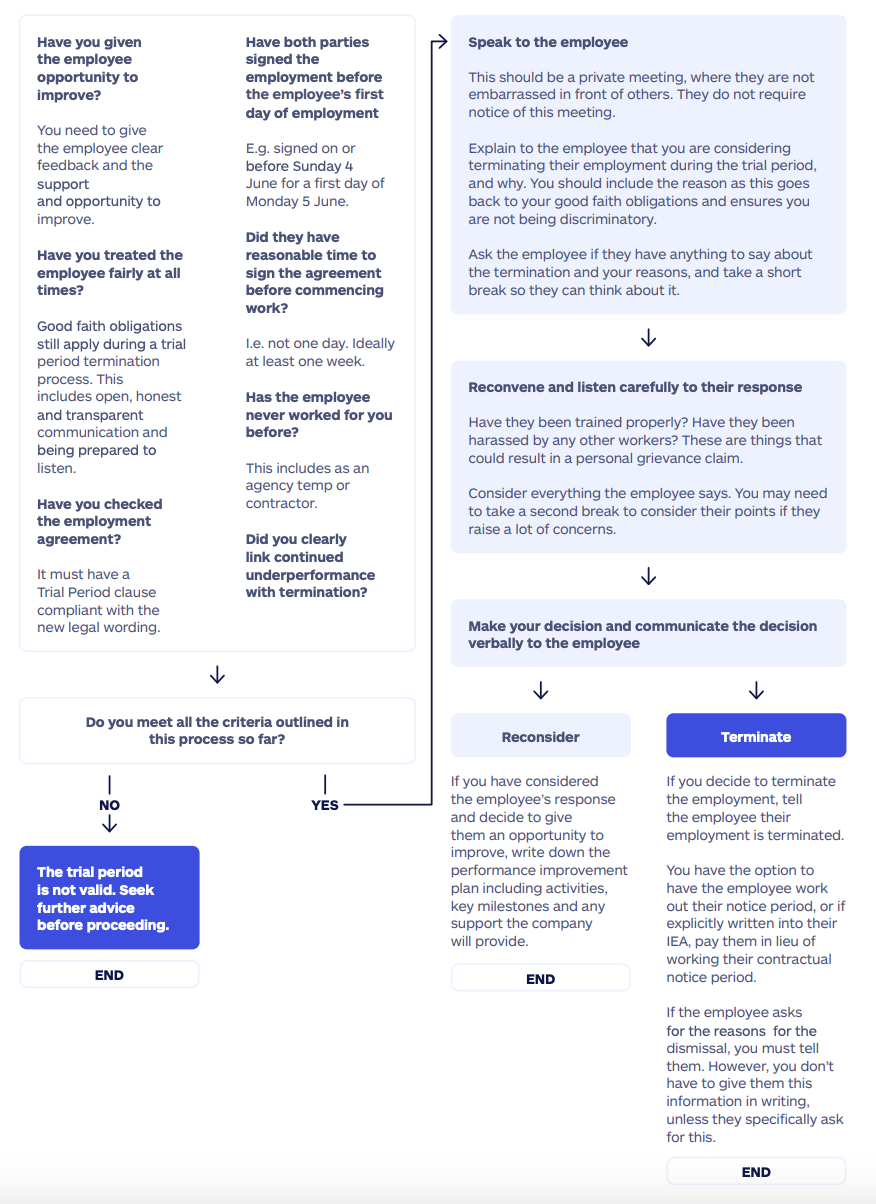Just before Christmas, the Government passed the Employment Relations (Trial Periods) Amendment Act 2023, which reinstated the ability for businesses of all sizes to utilise 90-day trial periods for new employees.
Prior to the amendment, only businesses with 19 or fewer employees could use 90-day trial periods when taking on a new hire. All others had to use probationary periods instead.

90-day trials are a really effective tool for assessing new team members, and provide some protection against personal grievance claims. But like all employment processes, they need to be done with the right attention to good faith and proper procedure.
So let's take a look at how 90-day trial periods work, how your business can set up and run quality trial periods, and what to do if you need to terminate someone’s employment during the trial period.
What are 90-day trial periods?
90-day trial periods allow employers to assess a new employee's suitability for a role, based on their performance, conduct, attitude etc. within a defined period.
All trial periods must be included in and agreed to by the employee as part of the employment agreement.
90-day trials can last for up to the first 90 calendar days of employment, but cannot be extended beyond 90 days.
Trial periods can be used for all new employees, as long as they have not been employed with the company before. This means you cannot utilise them for existing employees starting a new role but you can use them for new employees that you’ve previously "engaged" in a different capacity, e.g. as a contractor or temp.
Remember, employees include all casual, permanent, and fixed-term staff. Independent contractors are not employees.
You cannot use a 90-day trial period for people on certain work visas, e.g. an Accredited Employer Work Visa.
What protection does a 90-day trial period give an employer?
Employees on a 90-day trial period are unable to raise a personal grievance related to dismissal, as long as the dismissal was managed fairly and in accordance with the law governing 90-day trial periods.
Employees can still raise a grievance on other grounds, such as for unjustified disadvantage (e.g. you failed to provide training or the opportunity to improve), harassment, discrimination, or if the trial period itself is invalid.
All other conditions of employment (e.g. acting in good faith) and minimum entitlements around pay, conditions, leave, and health and safety are not affected by the trial period.
How to make sure a trial period is valid
- The 90-day trial period and its length must be clearly stated in the employee’s employment agreement.
- You must give the employee ‘fair and reasonable time’ to review their agreement and seek advice prior to starting work. We recommend a minimum of 2 working days.
- Both parties need to sign the employment agreement prior to the employee’s start date (it can’t be on their first day of work).
- The person cannot have worked for you before - make sure your recruitment processes include checks that there are no pre-existing employment relationships, e.g. if the company had a different owner previously.
What if I can’t use a trial period?
In the circumstance that you can’t include a 90-day trial period in the employment agreement (e.g. if the employee already works for you or has worked for you before), you may be able to use a probationary period instead.
Probationary periods are similar to 90-day trial periods but do not offer the same protection from personal grievances for unjustified dismissal. They can be for any length of time (so long as it is fair and reasonable) and the employee agrees. They can also be extended, as long as both parties agree.
Note: You can't put an employee on a probationary period after a trial period. If you haven’t given the employee notice by the end of the trial period, then the trial period expires and their employment continues as usual.
How to run an effective trial period
- Ensure your recruitment process is solid so you give yourself the best chance of getting the right person for the role and the organisation. This includes doing your due diligence, like reference checks, making sure they have the right qualifications, and doing your best to make sure they have the right skills for the role
- Have a robust clause in the employment agreement. This is where the employee agrees to take the job subject to a 90-day trial period – it can be useful to remind them of this if problems arise.
- Implement a well-structured onboarding process for your new employee. Provide support and training, set regular review meetings, give detailed feedback, and document the process. Don't let things lie; address any issues (even minor ones) early so new people know where they stand and what success looks like.
- Treat the person as you would any other employee. This means being fair, providing clear direction, and giving them the opportunity to improve.
- If there are issues that may lead to termination, make it clear that they may be dismissed if they don't improve. This might feel uncomfortable, but if it’s not made crystal clear to the employee that their job may be on the line, then you may be challenged when it comes to dismissal.
MyHR's Chief Evangelist, Sylvie Thrush Marsh, explains the ins and outs of Trial Periods.
How to terminate employment during a trial period
If you want to end a person’s employment while they are on a valid 90-day trial period, you don’t need to provide a reason for doing so.
However, good faith obligations still apply, so you should meet with the employee privately to explain why they haven’t met your expectations and be prepared to listen to their side of the story.
Dismissal process map

It may be that they haven’t been trained properly or have suffered harassment from other workers.
If you still decide to dismiss the employee, tell them their employment is terminated. If they ask for the reasons for the dismissal or want it put in writing, you need to give that to them.
You must give the person the correct amount of notice, so there are no “instant dismissals” during a trial period. Depending on the terms of their employment agreement, you may have the option to pay them in lieu of working their contractual notice period.
If you decide to give them an opportunity to improve, create a performance improvement plan that includes activities, key milestones, and any support you will provide.
Need support?
If you're considering terminating an employee on a valid 90-day trial period, and want to ensure you've followed all the necessary compliance requirements and acted in good faith, speak with one of MyHR's HR experts. They can help you with any employment-related issue or process, anytime and anywhere.




